TL;DR: “Detox” cleanses are mostly marketing — your liver and kidneys do the heavy lifting — but certain drinks can support hydration, digestion, blood sugar control, and a healthy gut microbiome. These effects (plus small, consistent habits) help with weight management and gut comfort. Below: 7 evidence-backed drinks, recipes, when to use them, safety, and how to build them into a real, sustainable plan. NCCIH+1
1) What “detox” actually means — and what the science says
“Detox” is a popular word, but medically it’s imprecise. Your liver, kidneys, lungs, skin and gut are constantly processing and eliminating waste and foreign compounds — they don’t wait for a juice cleanse to start working. Most “detox” diets promise rapid removal of toxins or dramatic weight loss; the research does not support broad claims that cleanses flush toxins from healthy people. Instead, short, restrictive cleanses often cause muscle loss, nutrient gaps, and rebound overeating. NCCIH+1
That said — some beverages can support the body’s natural processes by improving hydration, lowering post-meal blood sugar, supplying probiotics or bioactive compounds, or improving digestion. Those effects are measurable and useful when combined with a sensible calorie plan, whole foods, and movement. I’ll show you drinks with real evidence behind them and how to use them practically (not as a miracle fix). NCCIH
2) How drinks can help weight loss & gut health (mechanisms)
Here are the plausible, evidence-based ways beverages can support your goals:
- Hydration & pre-meal filling: drinking water before meals reduces calorie intake and can boost weight loss when combined with a reduced-calorie diet. PubMed+1
- Small metabolic boosts: drinks like green tea (EGCG + caffeine) can modestly increase energy expenditure and reduce body weight over time. Effects are small but consistent. PubMed+1
- Blood sugar & appetite control: acetic acid (vinegar) can blunt post-meal glucose spikes and may modestly reduce weight in some trials. Harvard Health+1
- Gut microbiome support: fermented drinks (kefir, plain yogurt, certain kombuchas) supply live microbes and can help gut diversity and GI symptoms — with downstream metabolic benefits in some studies. MDPI+1
- Anti-inflammatory and digestive support: herbs/spices such as ginger and turmeric interact with the gut and microbiome, reducing inflammation and improving motility in several trials. PubMed+1
Bottom line: use drinks to support healthy habits — hydration, lower sugar intake, improved digestion and gut microbes — not to “flush toxins.”
3) The 7 science-backed detox drinks (recipes, evidence, tips)
Note: for each drink I list why it helps, an easy recipe, approximate nutrition, when to drink it, variations, and safety notes.
1) Green tea (hot or iced) — antioxidant + small weight-loss benefit
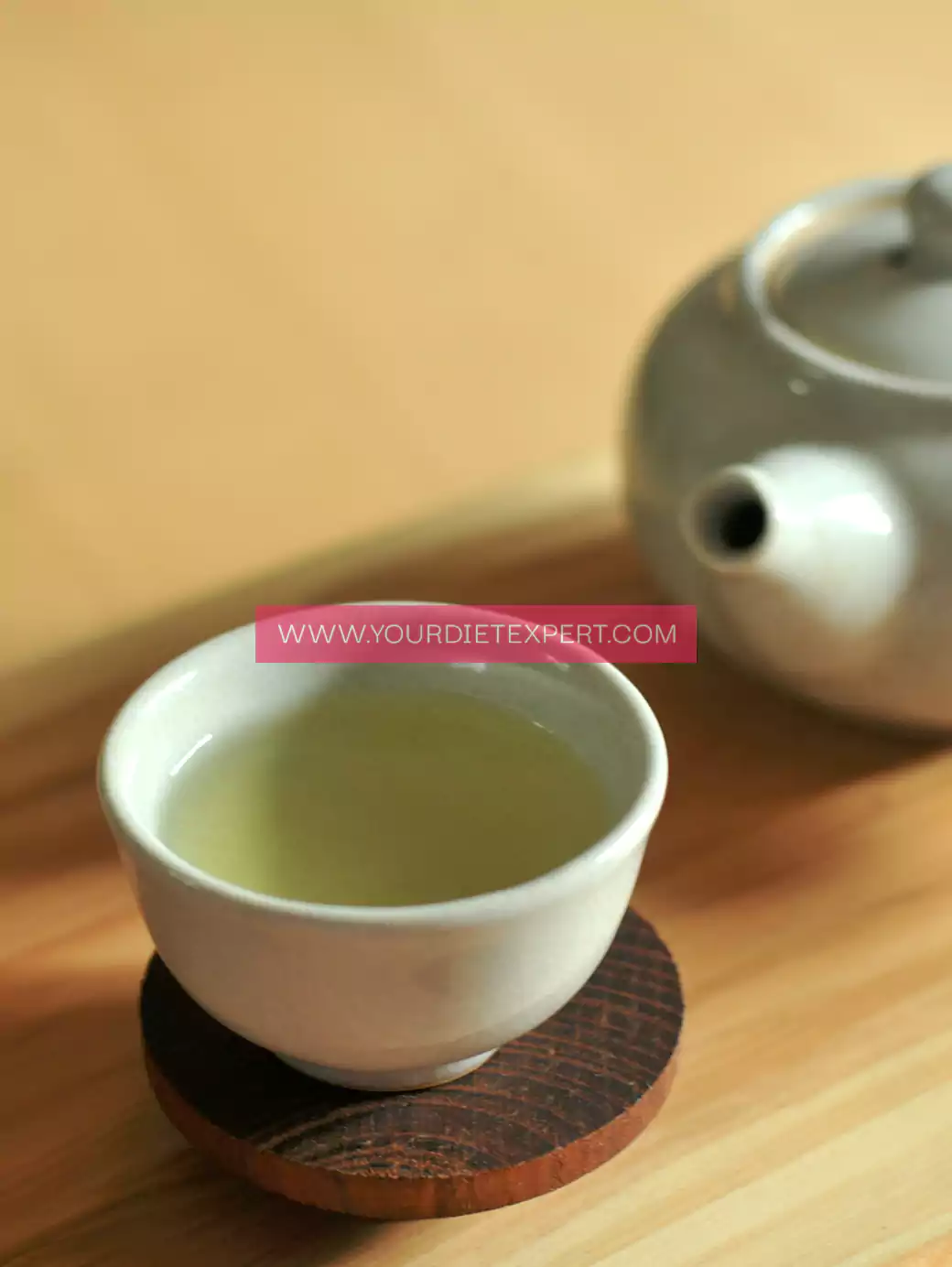
Why this works: Green tea contains catechins (EGCG) and some caffeine. Meta-analyses of randomized trials show green-tea extracts or catechin-rich preparations produce modest reductions in body weight, BMI and body fat when taken consistently; there’s also evidence for improved cardiometabolic markers. Effects are not huge — but daily green tea is calorie-free and a healthy swap for sugary drinks. PubMed+1
Recipe (classic):
- 1 tsp loose green tea (or 1 teabag)
- 8–10 oz (240–300 ml) hot water, ~75–80°C (don’t pour boiling water — it gets bitter)
- Steep 2–3 minutes, strain. Optional: slice of lemon or a sprig of mint.
Nutrition (approx.): 0 kcal (if unsweetened). Adding lemon = negligible calories.
When to drink: 1–3 cups daily — morning or between meals. Avoid close to bedtime if caffeine bothers you. If you’re sensitive to iron-absorption issues, don’t drink with iron-rich meals. Frontiers
Variations/subs: Matcha (higher catechin concentration) — use in smoothies or as a powdered latte (watch added milk/sweeteners).
Safety: High doses of green tea extract have been linked, rarely, to liver injury — stick to brewed tea or moderate supplement doses and check with your clinician if you take medications. Medical News Today
2) Apple cider vinegar (ACV) tonic — acetic acid for glucose & appetite control
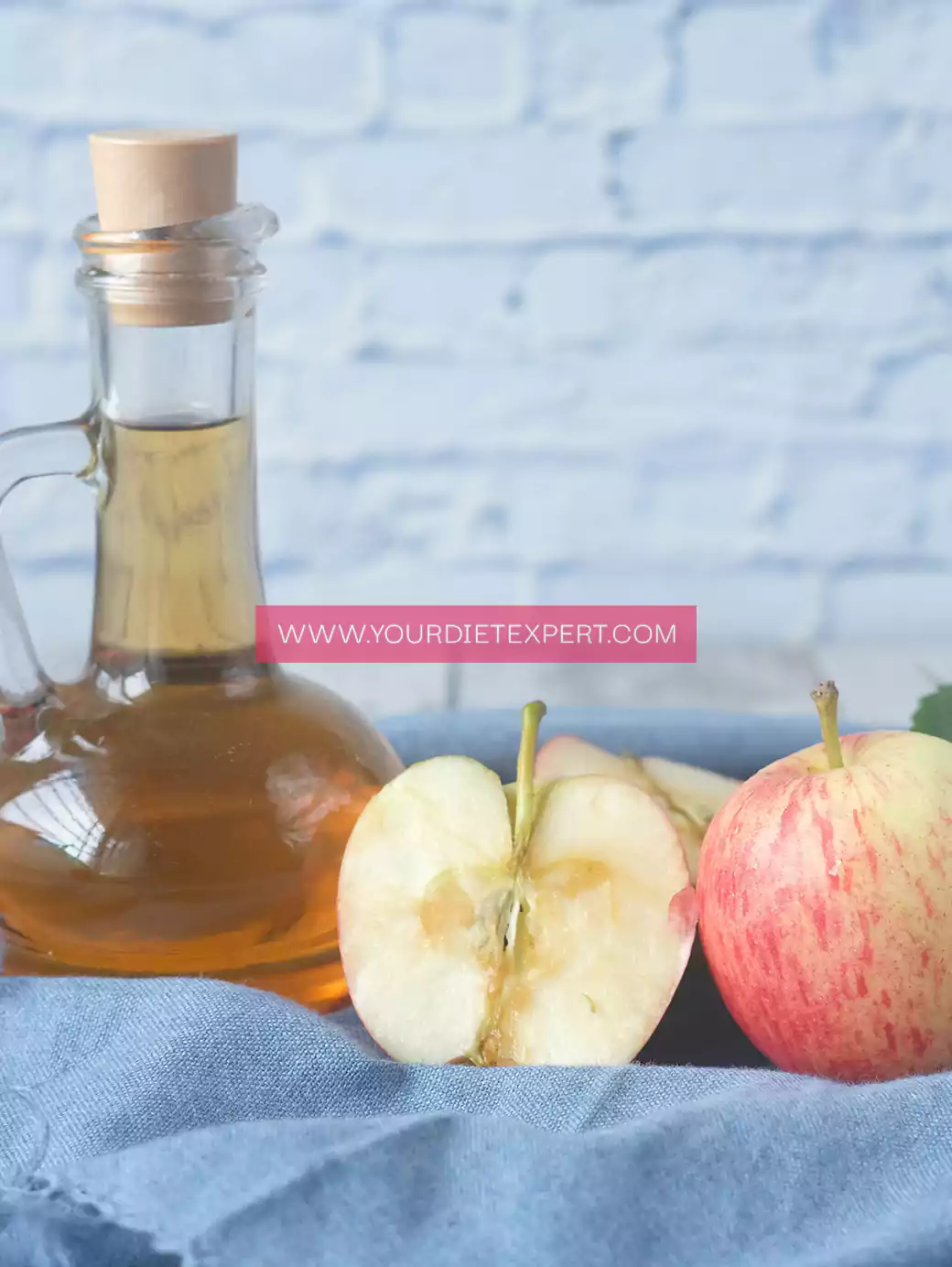
Why this works: Small human trials and meta-analyses find that acetic acid (the main component of vinegar) can modestly reduce body weight, waist circumference, and post-meal glucose spikes. The effect size is modest; ACV should complement, not replace, a calorie-controlled diet. Harvard Health+1
Simple recipe:
- 1 tablespoon (15 ml) raw, unfiltered apple cider vinegar (with “the mother”)
- 8–12 oz (240–350 ml) water
- Optional: 1 tsp honey or a dash of cinnamon (adds calories)
- Drink before or with a meal.
Nutrition (approx.):
- ACV 1 tbsp ≈ 3 kcal; honey 1 tsp ≈ 21 kcal → total ~24 kcal when honey added. (3 + 21 = 24)
When to drink: 1 small glass (diluted) before a carb-heavy meal may help blunt the glucose spike; users often take once daily. Don’t exceed 1–2 tbsp/day without medical advice. Mayo Clinic
Safety & tips: Always dilute (to protect tooth enamel and the esophagus). Use a straw, rinse your mouth with water after drinking, and avoid if you have active ulcers, chronic kidney disease, or take certain medications (diuretics, insulin, digoxin) — check with your provider. Mayo Clinic+1
3) Plain kefir (fermented probiotic drink) — live cultures for gut resilience
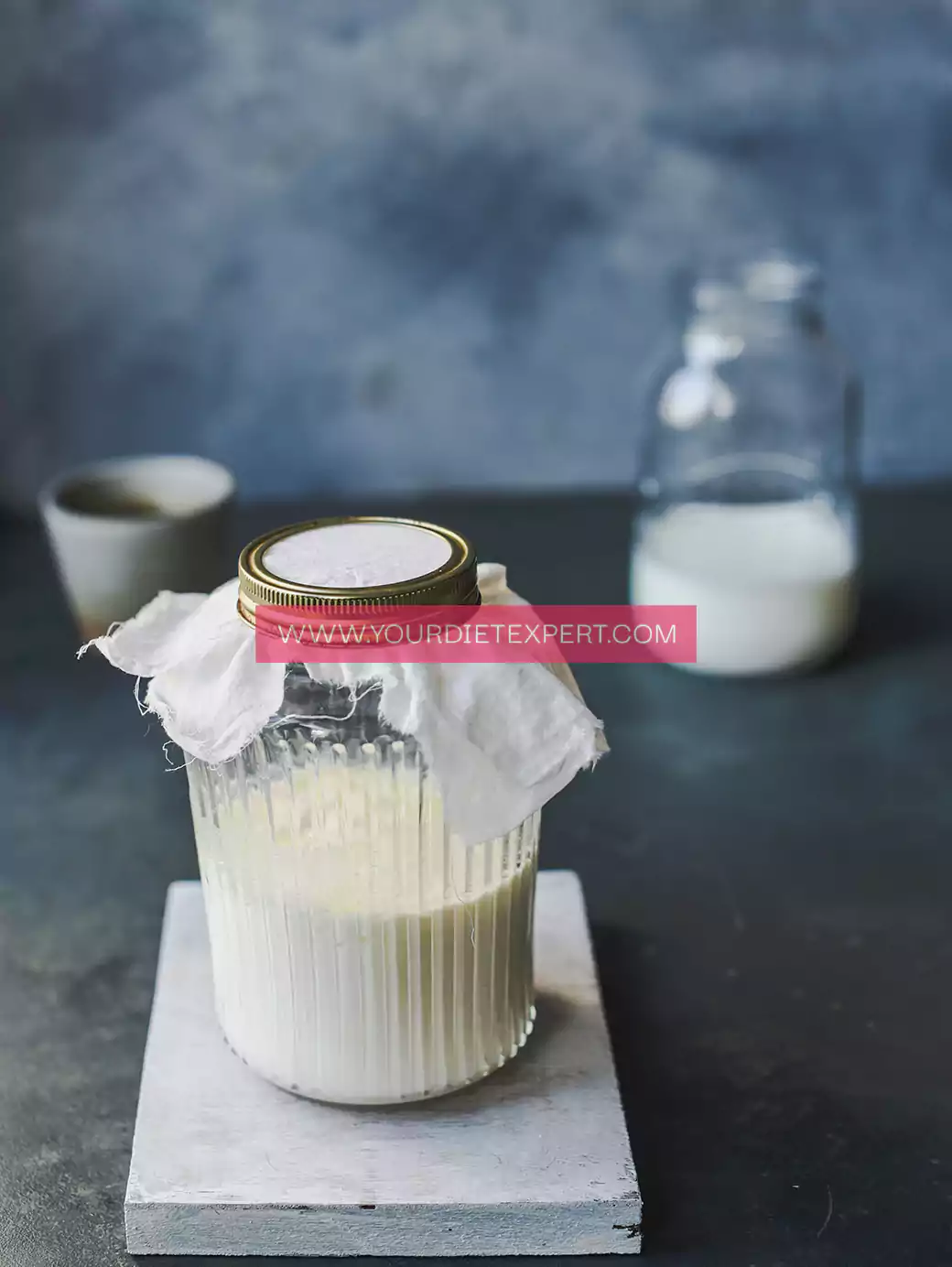
Why this works: Kefir is a fermented milk (or water kefir for non-dairy) rich in live microbes and can increase gut microbial diversity; studies link kefir intake to improved digestion, reduced GI symptoms, and small improvements in metabolic markers in athletes and overweight adults. Probiotics may help with bloating and stool regularity and may modestly support weight management through microbiome modulation. MDPI+1
Recipe (everyday):
- 1 cup (240 ml) plain kefir (choose unsweetened) — dairy or plant-based if needed.
- Drink chilled plain, or blend with ½ cup berries for a smoothie (adds calories).
Nutrition (approx.): (plain, low-fat kefir) ~100–150 kcal per 1 cup, protein 7–10 g, carbs 9–12 g, fat 2–4 g (varies by brand).
When to drink: With breakfast, as an afternoon snack, or at night to promote gut comfort. If adding fruit, account for the extra carbs. MDPI
Safety: Most people tolerate kefir well; immunocompromised people should consult clinicians before taking live cultures. Choose plain, low-sugar versions to avoid added calories. NCCIH
4) Ginger + lemon tea — digestion, nausea relief, and appetite control

Why this works: Ginger root (gingerol, shogaol) has strong evidence for reducing nausea, easing bloating, improving GI motility, and some trials/meta-analyses suggest modest benefits for weight and metabolic markers. It also feels warming and satiating. PubMed+1
Recipe (fresh ginger tea):
- 1–2 inch fresh ginger root, sliced or grated (about 10–15 g)
- 2 cups (480 ml) water
- Simmer 8–10 minutes, strain. Add fresh lemon and optional 1 tsp honey.
Nutrition (approx.): Unsweetened ≈ 5 kcal; with 1 tsp honey add ~21 kcal.
When to drink: After meals to aid digestion, or in the morning for soothing and gentle appetite control.
Safety: Ginger is generally safe; high doses can interact with blood-thinning meds — check with your clinician if you take anticoagulants. Johns Hopkins Medicine
5) Turmeric (curcumin) golden tonic — anti-inflammatory + microbiome support
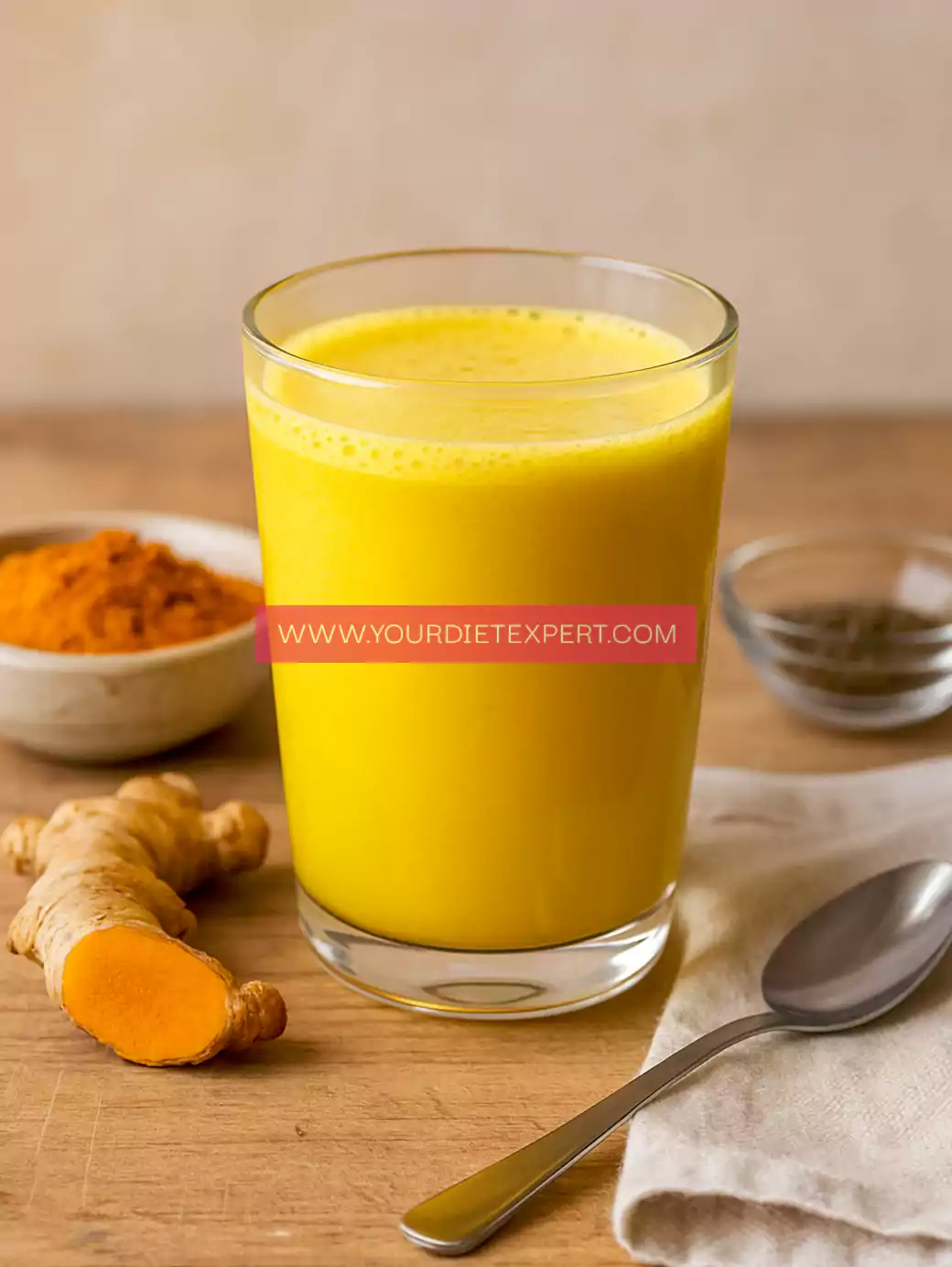
Why this works: Curcumin (turmeric’s active compound) has anti-inflammatory and antioxidant effects and interacts with the gut microbiome in ways that may support metabolic health and gut barrier function in some studies. Much of the human data is preliminary, but turmeric as a culinary spice or tonic is low risk when used appropriately. PMC+1
Simple golden tonic:
- 1 cup (240 ml) warm (not boiling) plant milk or dairy milk
- ½–1 tsp ground turmeric (or 1 tsp grated fresh)
- ¼ tsp black pepper (piperine boosts curcumin absorption)
- ½ tsp lemon or 1 tsp honey (optional)
- Whisk and drink warm.
Nutrition (approx.): Unsweetened almond milk base ≈ 30 kcal + honey 21 kcal (if added) → ~51 kcal in this version.
When to drink: Evening or between meals; soothing and anti-inflammatory. For stronger effects, curcumin supplements have been used in trials but speak to a clinician before starting them.
Safety: Turmeric in food amounts is safe. High-dose supplements can interact with blood thinners and some drugs; piperine increases absorption but also affects drug metabolism. ScienceDirect
6) Hibiscus tea — antioxidant, may help blood pressure & body fat

Why this works: Hibiscus sabdariffa (tart hibiscus tea) contains anthocyanins and polyphenols. Trials show hibiscus tea lowers blood pressure in pre- and mildly hypertensive adults, and some studies suggest reductions in body fat and metabolic benefits. Evidence on weight loss is promising but not definitive. PMC+1
Recipe:
- 1 tbsp dried hibiscus petals (or 1 teabag)
- 8–12 oz (240–350 ml) hot water, steep 5–7 minutes, strain. Serve hot or cold.
- Optional: cinnamon stick or small splash of orange juice.
Nutrition (approx.): 0 kcal unsweetened.
When to drink: 1–2 cups daily — great iced as a refreshing alternative to soda.
Safety: Generally safe; hibiscus can interact with diuretics and some medications — check with your clinician if you’re on BP meds or pregnant. MDPI+1
7) Lemon + cucumber infused water — hydration, appetite control, and flavor
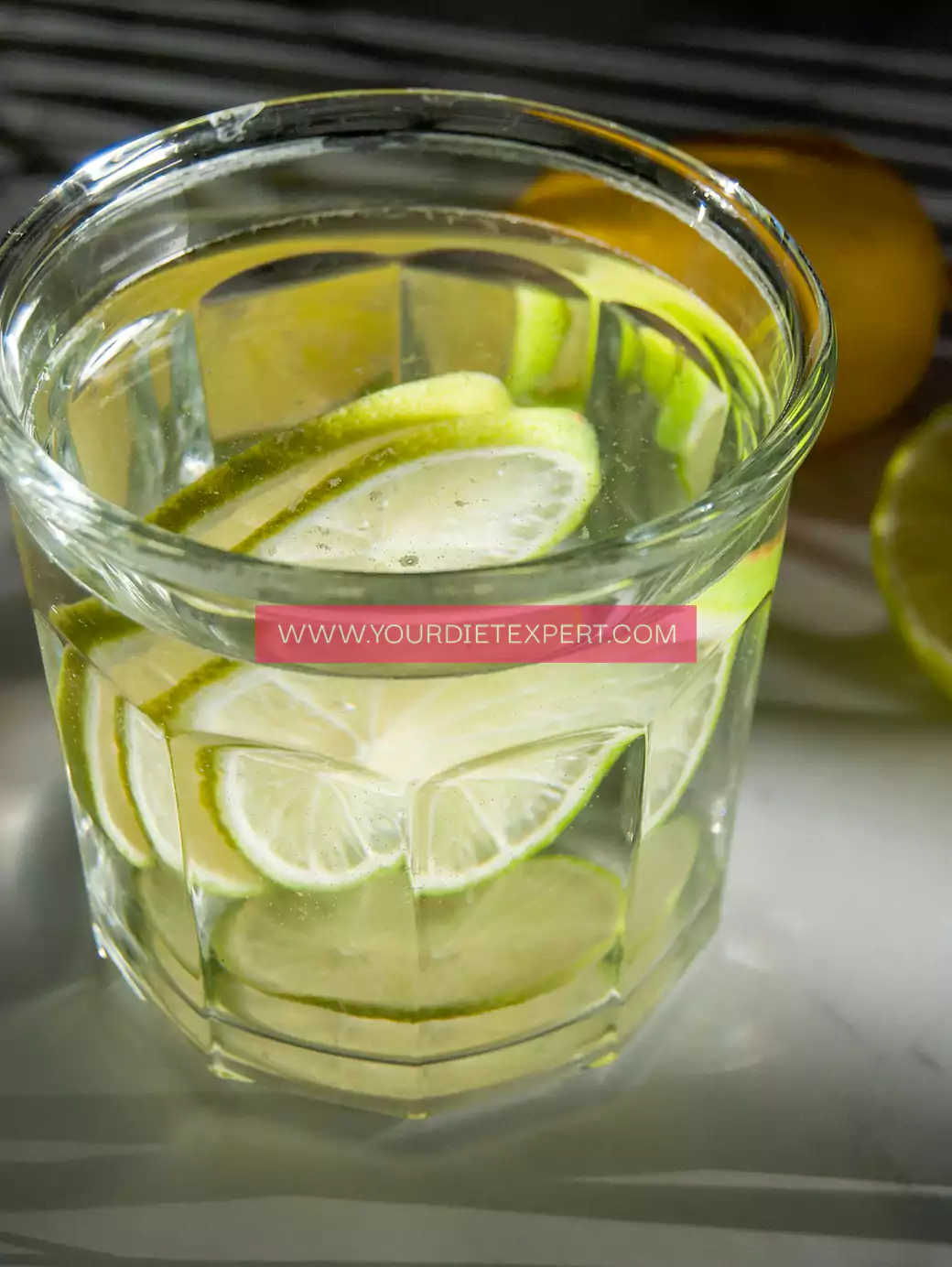
Why this works: Replacing sugary beverages with flavored water improves calorie balance. Pre-meal water (even plain or lemon water) reduces calorie intake and can accelerate weight loss when part of a hypocaloric plan. Infused water also eases digestion and increases daily fluid intake. PubMed+1
Recipe (big jug):
- 1 large pitcher (1.5–2 L) water
- ½ cucumber thinly sliced
- 1 lemon thinly sliced
- 6–8 fresh mint leaves (optional)
- Chill 1–2 hours, then sip all day.
Nutrition (approx.): ~0–5 kcal per 8-oz serving (negligible unless you add sweeteners).
When to drink: Sip throughout the day and drink 1 cup (250 ml) 20–30 minutes before meals to reduce meal intake and boost hydration.
Safety: Gentle and safe. If you have acid reflux, citrus could irritate — monitor individual response.
4) How to use these drinks safely & effectively (practical rules)
- Combine, don’t replace: Use these drinks with a balanced diet, calorie awareness, fiber, and movement — not instead of meals. Weight loss requires an energy deficit over time. PMC
- Hydration first: Swap sugar drinks for infused water or hibiscus — often the biggest win is cutting liquid calories. Medical News Today
- Timing tips: Pre-meal water (or ACV tonic before carbs) can blunt appetite and glucose; green tea & kefir between meals support metabolism & the microbiome. PubMed+1
- Watch sweeteners: Adding sugar or large amounts of honey defeats the purpose — keep sweet additions minimal.
- Medicine and pregnancy check: If you take meds (especially for blood pressure, diabetes, blood thinners), are pregnant, breastfeeding, or immunocompromised, check with your clinician before adding daily vinegar doses, concentrated supplements, or probiotic therapies. Mayo Clinic+1
5) 7-day sample plan (easy, sustainable)
Replace sugary drinks with the following daily pattern. Portions are flexible — this is a guide you can repeat week to week:
- Morning: Warm ginger + lemon tea (or green tea) → breakfast.
- Mid-morning: Kefir (plain) or green tea if you prefer.
- Before lunch: 1 small glass ACV tonic (diluted) OR 1 cup water (pre-meal).
- Afternoon: Green tea or hibiscus iced tea.
- Evening: Turmeric golden tonic (if you like milk drinks) or warm ginger tea for digestion.
- All day: Sip lemon-cucumber water.
Tip: Keep a reusable bottle with infused water; brew big batches of hibiscus or ginger tea and refrigerate (48–72 hrs refrigerated).
6) FAQs — short, evidence-backed answers
Q: Will these drinks “detox” my liver?
A: No drink will “cleanse” a healthy liver the way marketing implies. These drinks support hydration, digestion, and the microbiome — which helps your body work better — but your liver and kidneys are the real detox organs. NCCIH+1
Q: Which drink actually helps weight loss most?
A: Evidence shows small consistent effects for green tea extracts (modest weight/BMI reductions) and modest benefits for apple cider vinegar on weight and waist circumference in some trials — but results are small and best combined with diet/exercise. PubMed+1
Q: Can I drink kombucha or fermented sodas instead of kefir?
A: Some kombuchas contain live microbes, but quality and sugar content vary. Plain kefir (or low-sugar fermented options) gives a reliable dose of probiotics with known benefits. MDPI+1
Q: Are there risks?
A: Yes — undiluted vinegar can erode enamel; herbs/spices can interact with meds; probiotic drinks may not be safe for severely immunocompromised people. Always dilute ACV, avoid excessive sweeteners, and discuss supplements/large doses with your clinician. Mayo Clinic+1
7) Make-ahead & storage
- Brew hibiscus and ginger tea in large jugs and refrigerate 48–72 hours (use within 3 days for best flavor).
- Kefir lasts ~7–10 days sealed in fridge (check label).
- ACV tonics are best fresh; mix in glass and drink same day.
- Infused water: replace fruit/cucumber every 24–48 hours to avoid off flavors.
Final notes — realistic expectations
If you’re hoping for dramatic, overnight changes — don’t rely on any single “detox” drink. The science supports small, consistent benefits from hydration, green tea catechins, acetic acid (in vinegar), probiotics, and anti-inflammatory spices — and those benefits add up when paired with healthy eating and activity. Think of these drinks as tools that make healthier choices easier and more enjoyable.
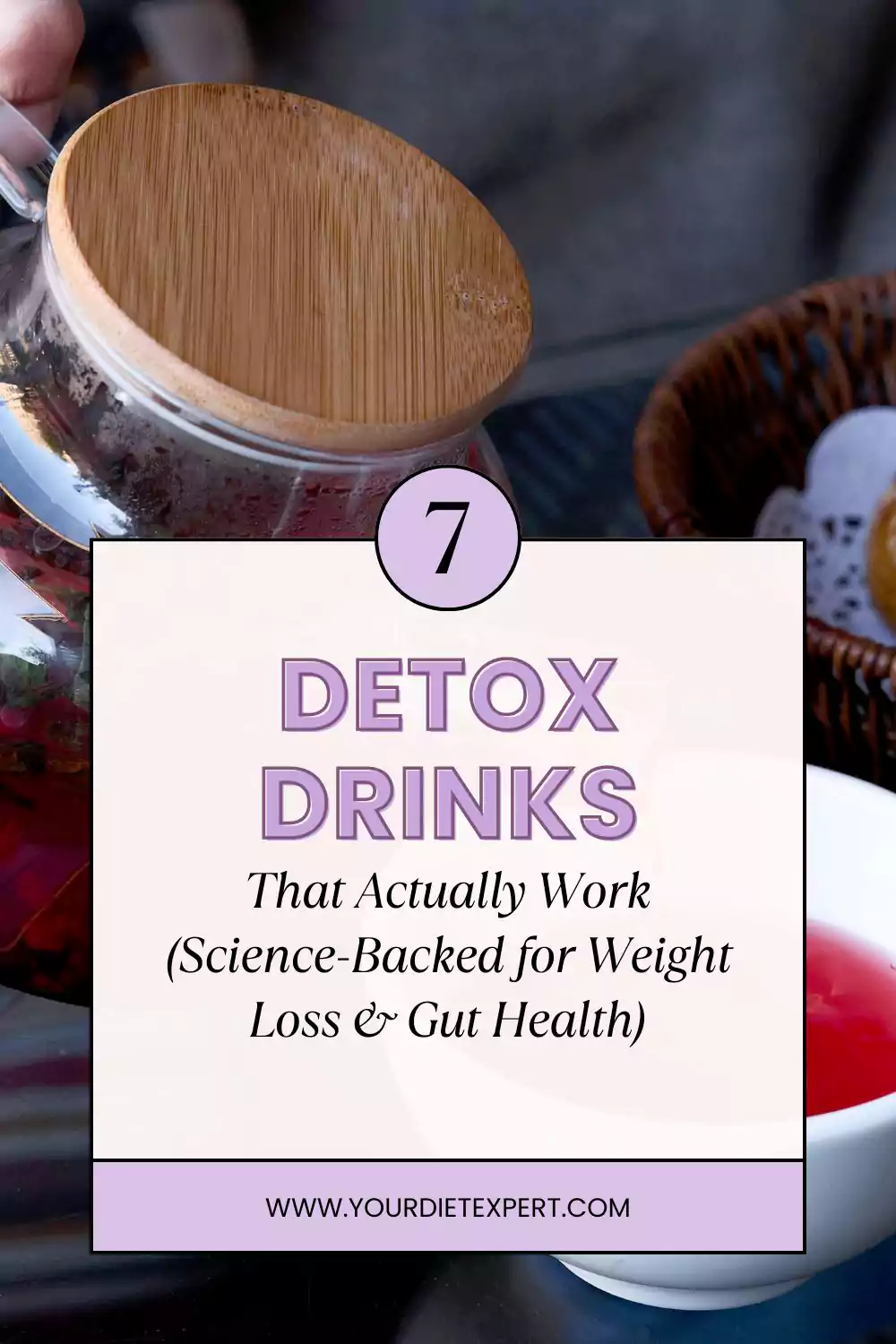



Leave a Reply